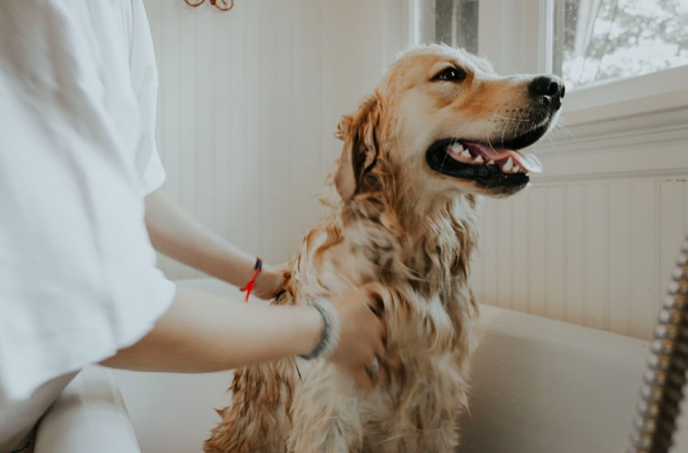Part of living with a dog implies brushing their coats, bathing them, teeth cleaning, nail clipping, as well as any handling needed in order to administer medicines or veterinary care. The list is a long one with most of these activities potentially stressful to most dogs. It is quite unfortunate that we cannot explain and have our dogs understand that all the unpleasant business will make them healthier and overall provide a better quality of life.
Dogs are not born to enjoy being handled. It is something that they need to learn. They are suspicious of well-intentioned owners as they lift their paw in an attempt to remove a painful item that just got lodged deep in between the toes just seconds ago on their walk.
Owners are often left with the bad taste in their mouths as they need to physically force their animals when they need to take care of some of these needs.
Getting our dogs to be comfortable with being handled requires lots of proactive work in puppyhood. If done properly, it is absolutely possible to have an adult dog that can respond with ease to the care needed.
It is, of course, also possible to teach adult dogs to at least accept our care. It will take, however; lots and lots of dedication paired with well thought-out training plans.
Animals are suspicious of restrain mainly because it takes away the option to flee, should the opportunity call for this. I would also add that they never get comfortable with any of these procedures because they have been forced to endure them. Rarely are they cooperative subjects. If we want to help our dogs enjoy, or at the very least not fear any of these procedures, the only viable option then is to take the time to make the experience less traumatic over and over again, so that our pup learns that while they might not enjoy having their nails clipped, or being lathered up with shampoo or whatever else we need to do to them, they can also learn that they will have the option of participating in their care. Making our dogs willing participants in their necessary care adds not only to their quality of life, but to their confidence that they can influence an outcome- this being one of the utmost reinforcing experiences any animal can have.
The (classical) pairing of events is at the heart of cooperative care and husbandry. Our dogs can learn that they will get something for their efforts and cooperation. For example, we do not need to clip all our dog’s nails on the same session. We can clip only as many nails as our dog indicates it can handle. Dogs signal to us all the time when they need a break; we just need to be observant in their communication and respectful of their limits. Notice for example, when your dog refuses to let you hold his paw, as part of a nail-clipping session, or an attempt to release their paw from our forceful clutch. What if we stopped before the first sign of refusal? How do you think this would affect our dog’s well-being and our ability to work on them with more ease the next time around?
Acknowledging that we must stop because our dog has signaled it has had enough (even when we just finished trimming one nail…) takes time and yes, empathy for their distress. Then again, at the end of the day, we must ask ourselves if acknowledging our dogs well-being is important for us so that we are willing to slow things down and learn a few strategies to make any sort of restrain or handling less stressful.
When it comes to baths, for example, how about practicing with mini-training sessions with lots of fun and games and great treats for their efforts for just walking to the bathroom voluntarily and when they do ending the session right there. Done! Easy-peasy. We repeat the step until our dog has learned the routine and realizes there is nothing to worry about. We proceed then, to having the dog jump in and out of the tub in search of a juicy piece of chicken that we have tossed into the tub. You get the idea, I think. Each of the necessary steps can be rehearsed separately, always making it easy and enjoyable for the dog. If the dog already has a very bad association with being bathed say, and he needs a bath pronto, it will be important to still protect the training plan by not forcing the dog until all the pieces are in place, an alternative must be found. It might mean that we must bath our dog elsewhere. This is even more relevant as we are teaching our dog to be trusting of us in this scenario and at least somewhat comfortable with the routine.
If your dog learns that all these procedures are either neutral or actually way fun, he will be able to tolerate much better the occasional hurried bath or a nail that was trimmed way too hard. Since your dog has had multiple good associations with his care, he will bounce back almost effortlessly from a not so ideal experience.
Life is never perfect but I take great care to make it as perfect as I can for my dogs. I too feel the pressure to get this done and have to make the effort to consider how these experiences are for them. What I have learned is that when I do take the time and I consider their perspective, I feel really good about this which only reinforces my efforts to do this again and again.

